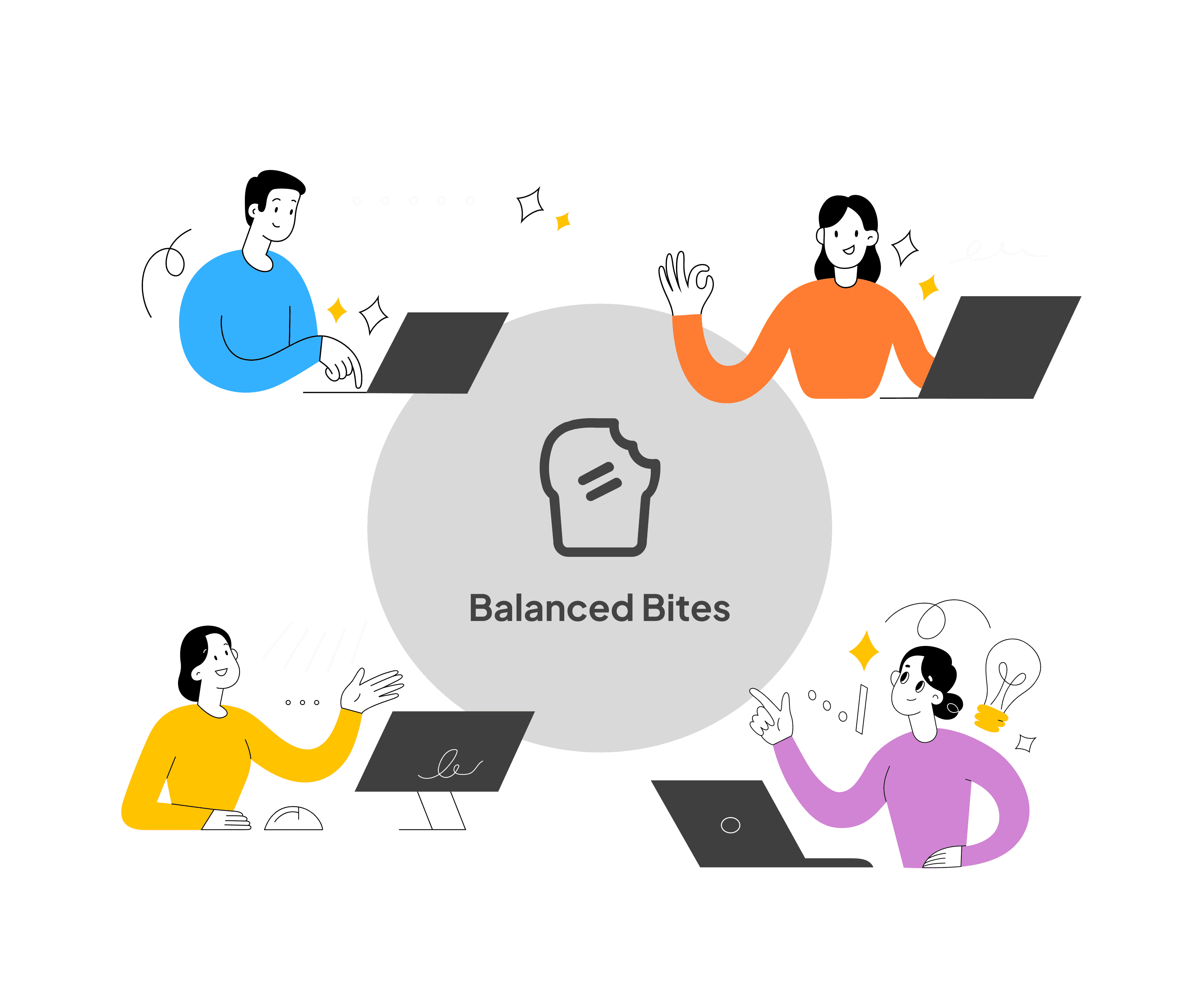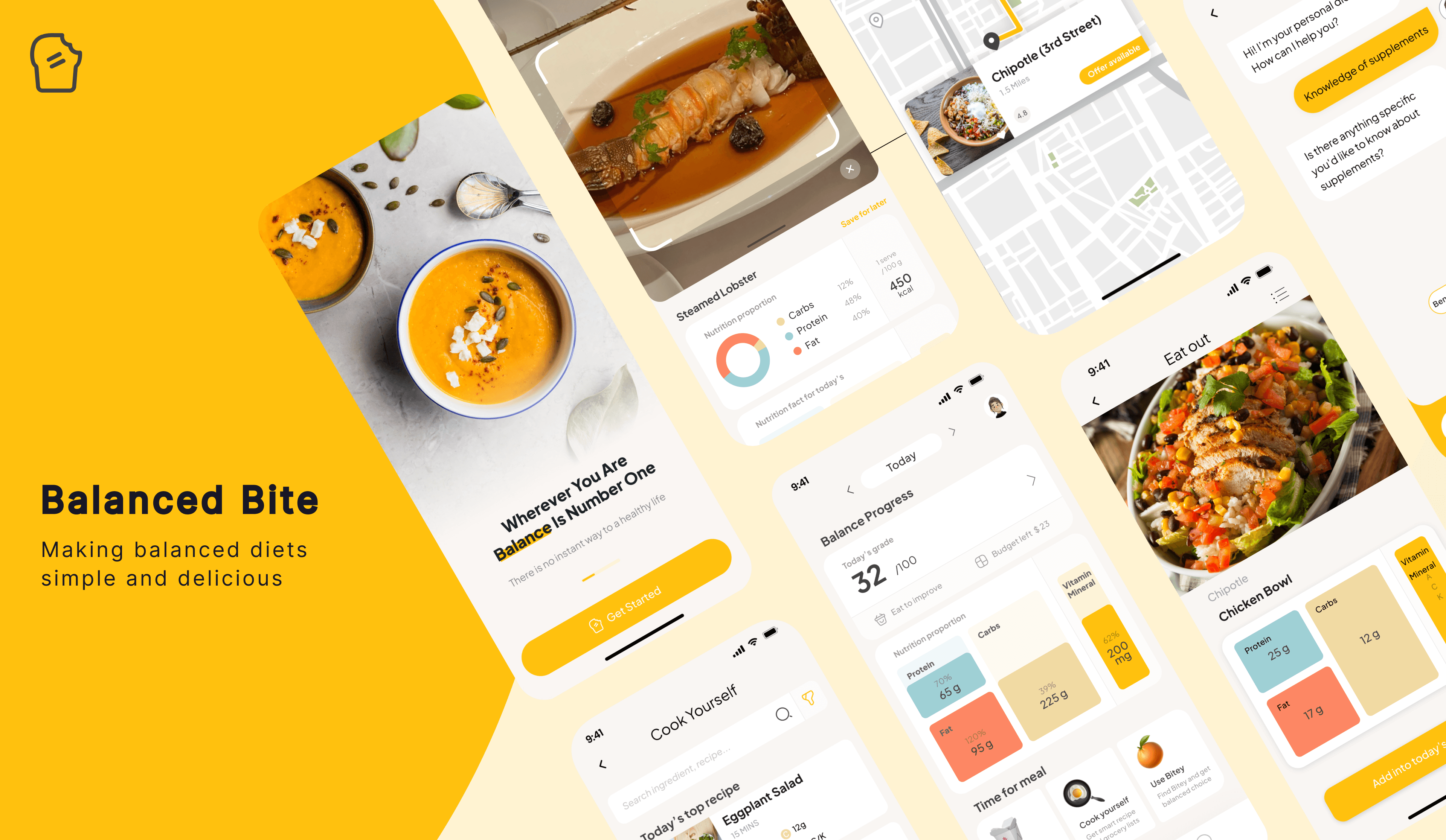
Overview
In my core class at IUB, my team explored the issue of maintaining a balanced diet in today's fast-paced world. We're creating an AI-based tracking system to help young adults understand their nutrition and achieve a balanced diet effortlessly.
Role
UX Designer
Timeline
Apr 2023 - May 2023, 6weeks
Responsibility/ Mission
Initiating design challenges
Conducted in-depth user research
Crafted a stress-busting app prototype
Challenge
Having a balanced diet is hard for busy young adults
Despite the benefits of healthful eating, many young adults (18-30) do not regularly engage in such behaviors. National data reveals that this age group tends to consume fewer fruits and vegetables than recommended and leans heavily on fast food, resulting in potential health concerns like weight gain and obesity. The project aims to uncover the core difficulties they face and seeks to provide practical solutions to pave their way toward a more nutritious and healthier lifestyle.
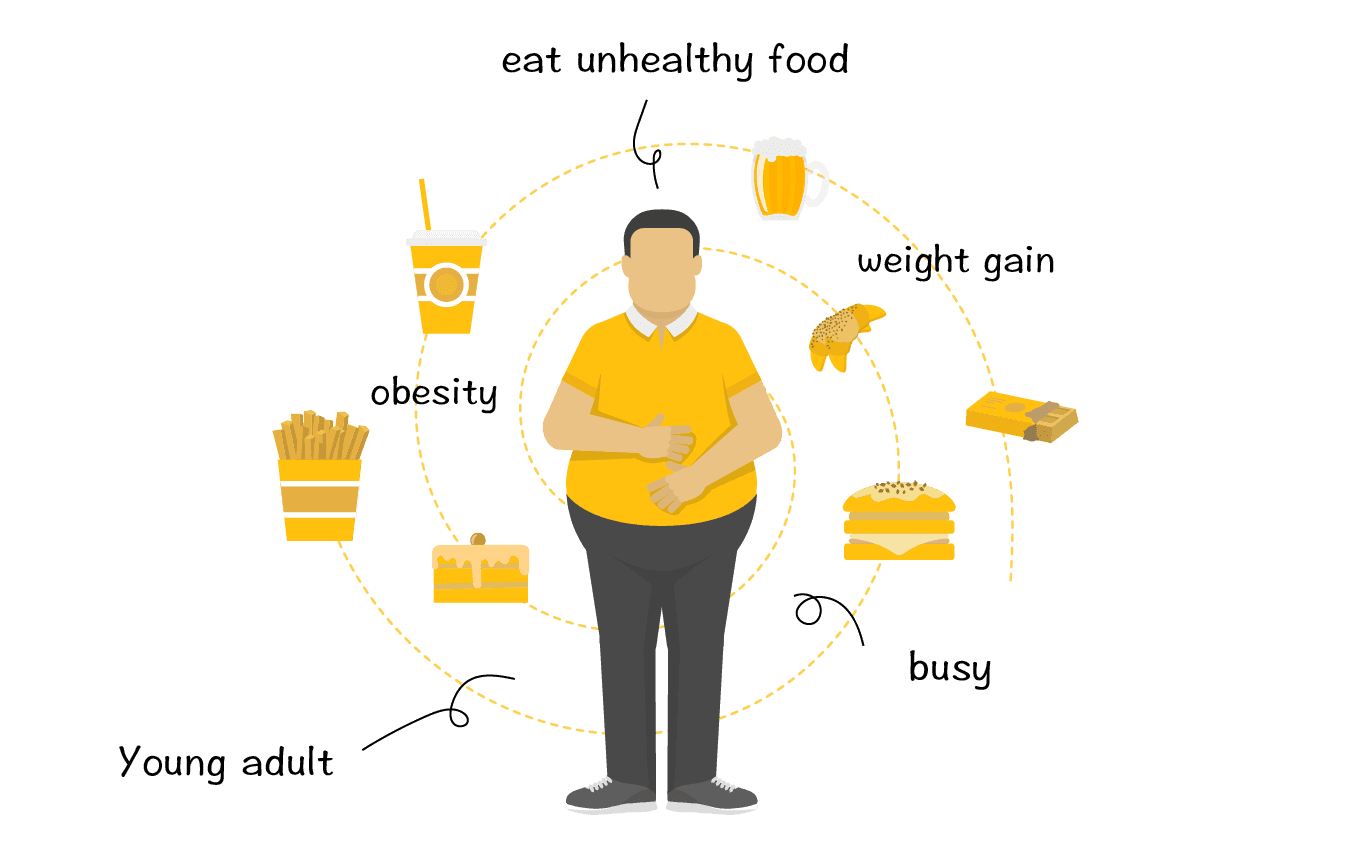
Research
Exploring the Current Dietary Landscape
Secondary Research: Investigating young adults' dietary habits and nutritional standards.
Understanding Nutritional Standards
We initiated the research by establishing the nutritional standards for young adults, encompassing categories such as vegetables, fruits, grains, dairy, protein, and oil. This involved determining the recommended weekly quantities based on their total calorie intake.
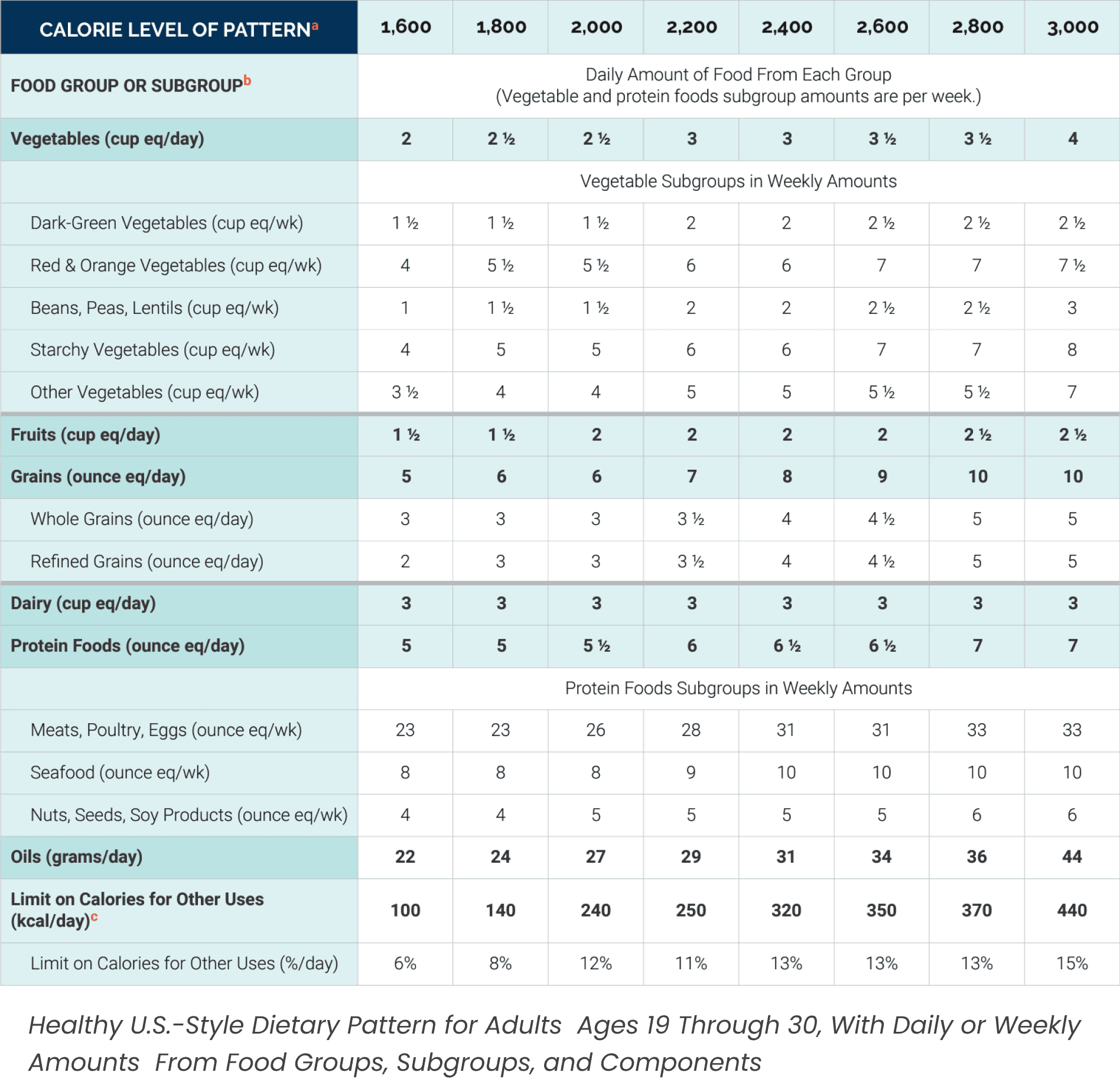
Comparing Current Intake
Next, I conducted a comparison between the current dietary intake of young adults and these established standards to assess the extent of deviation.
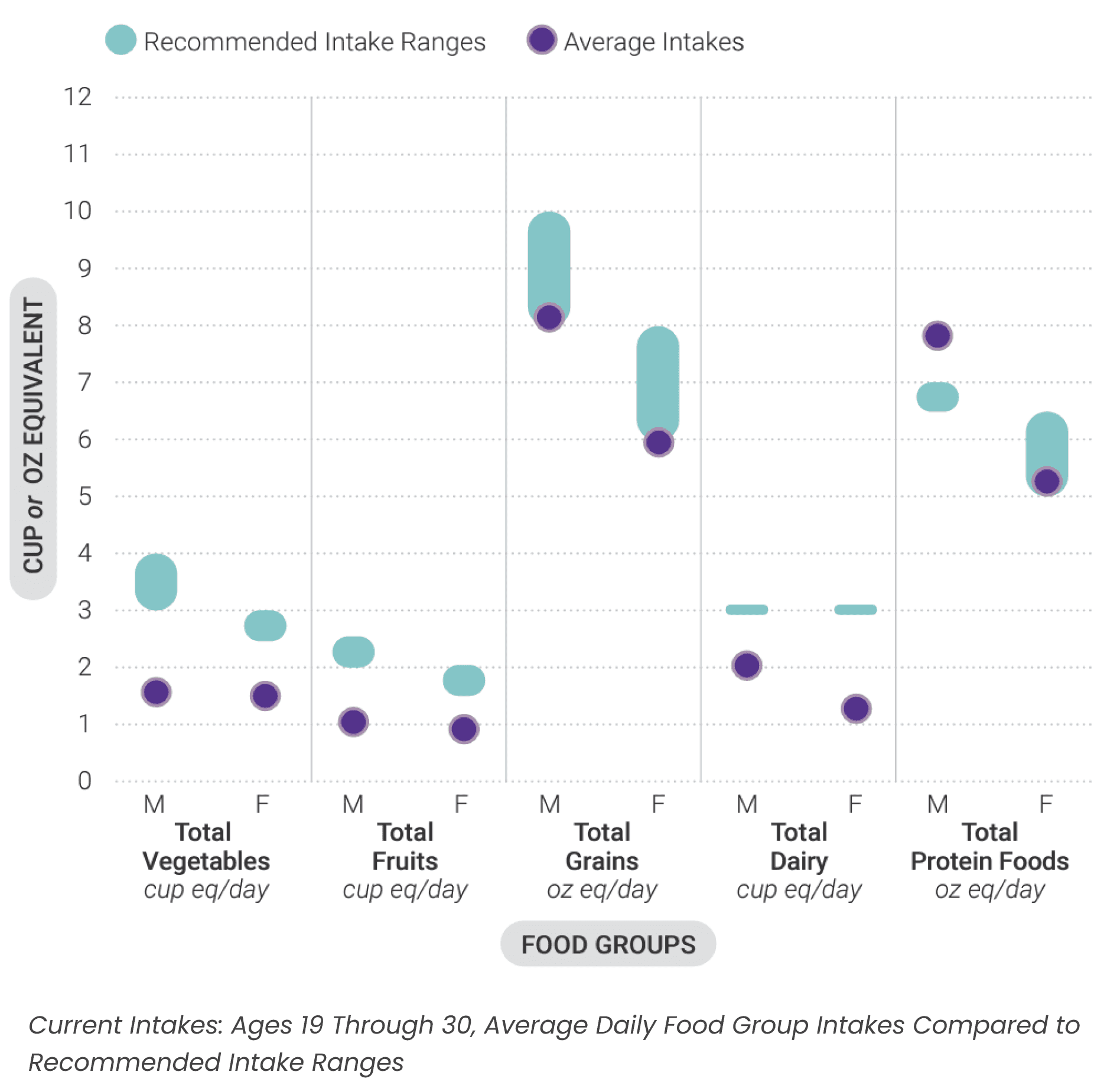
Identifying Excesses and Overconsumption
Finally, the research delved into identifying the percentages exceeding recommended limits for added sugars, saturated fat, and sodium, shedding light on ingredients that may be overconsumed in their diets.
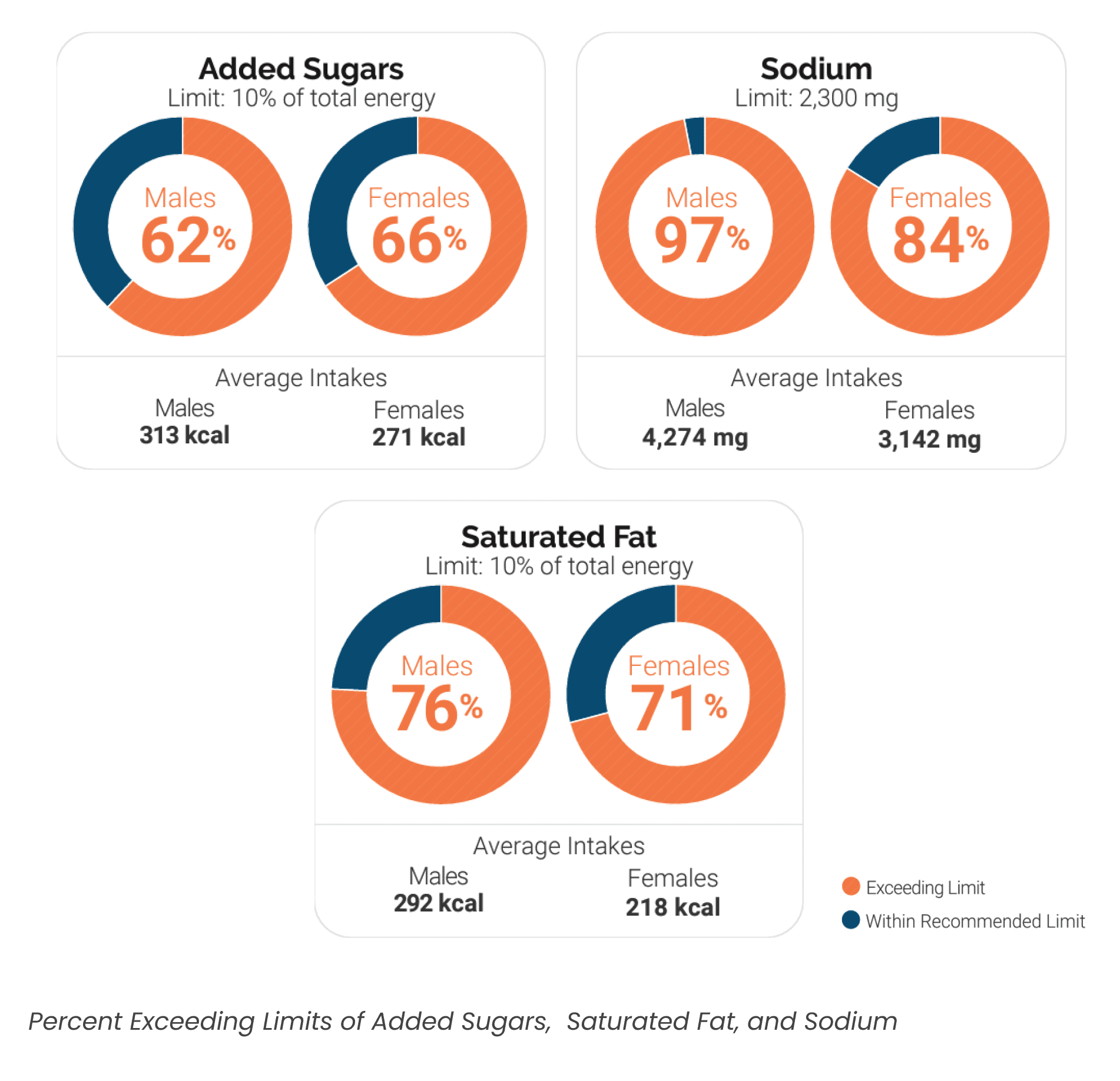
Primary Research: Conducting five interviews to develop their user personas.
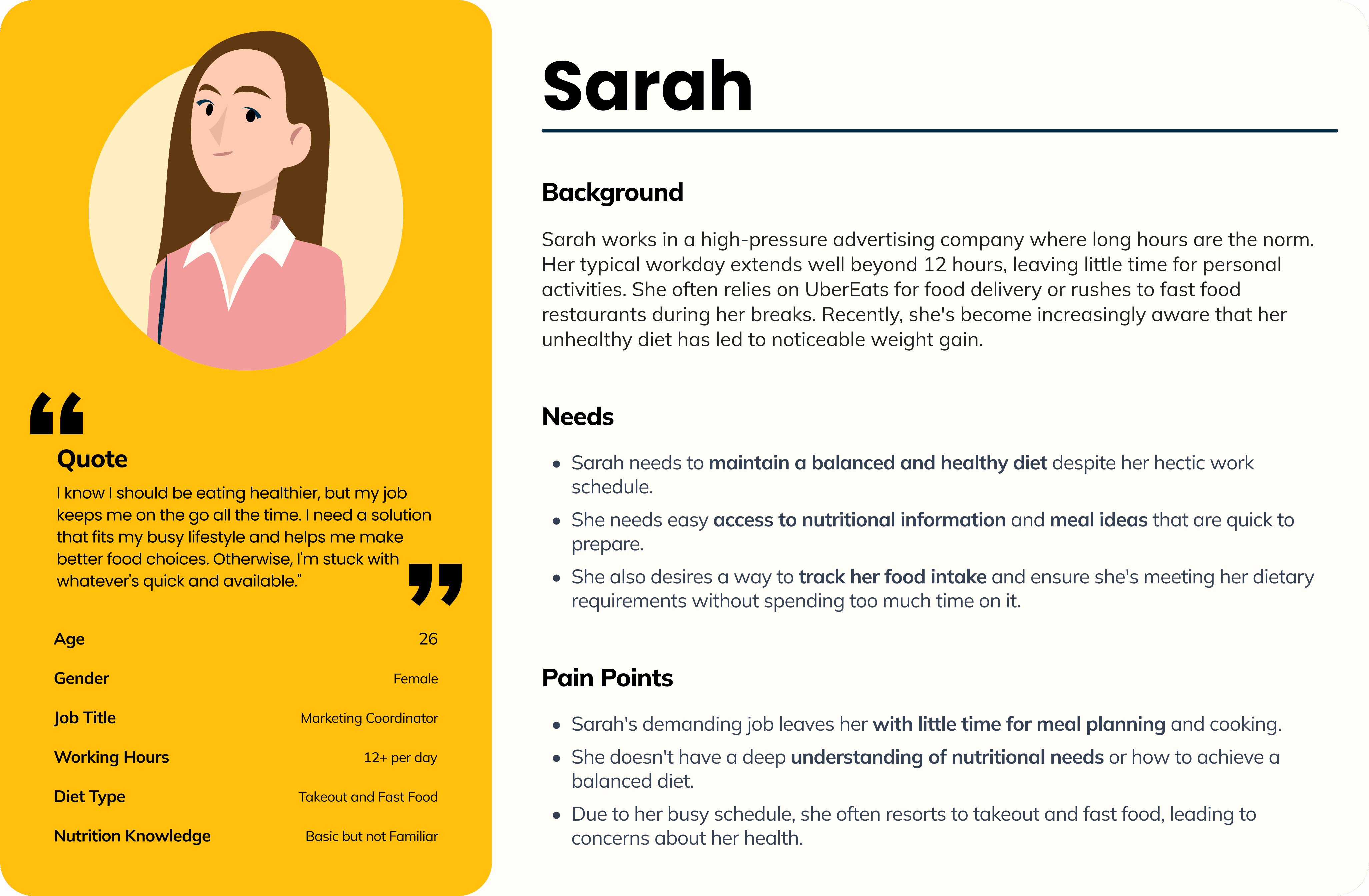
Define
Refining the Problem Space
We identified all the pain points from the research that they may encounter when it comes to a balanced diet, such as lack of time to prepare food, lack of knowledge about nutrition, they have limited access to nutritious food, and they are hard to record and balance their diet and so on.
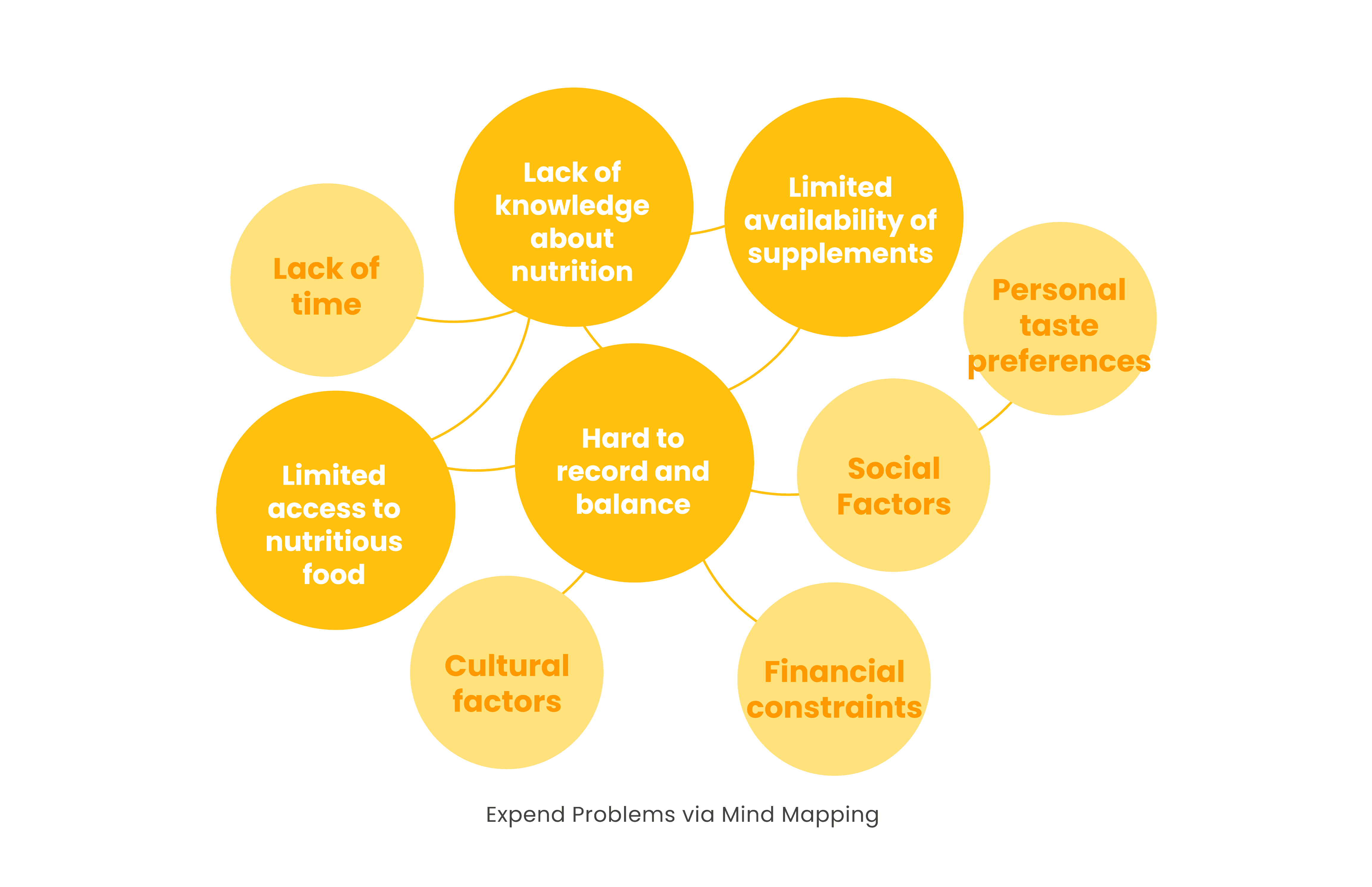
Insights from research and data analysis
Young adults face distinct challenges in maintaining a healthy diet, with busy schedules and limited nutrition knowledge emerging as pivotal factors. As a result, our project will focus on these critical aspects in our design approach.
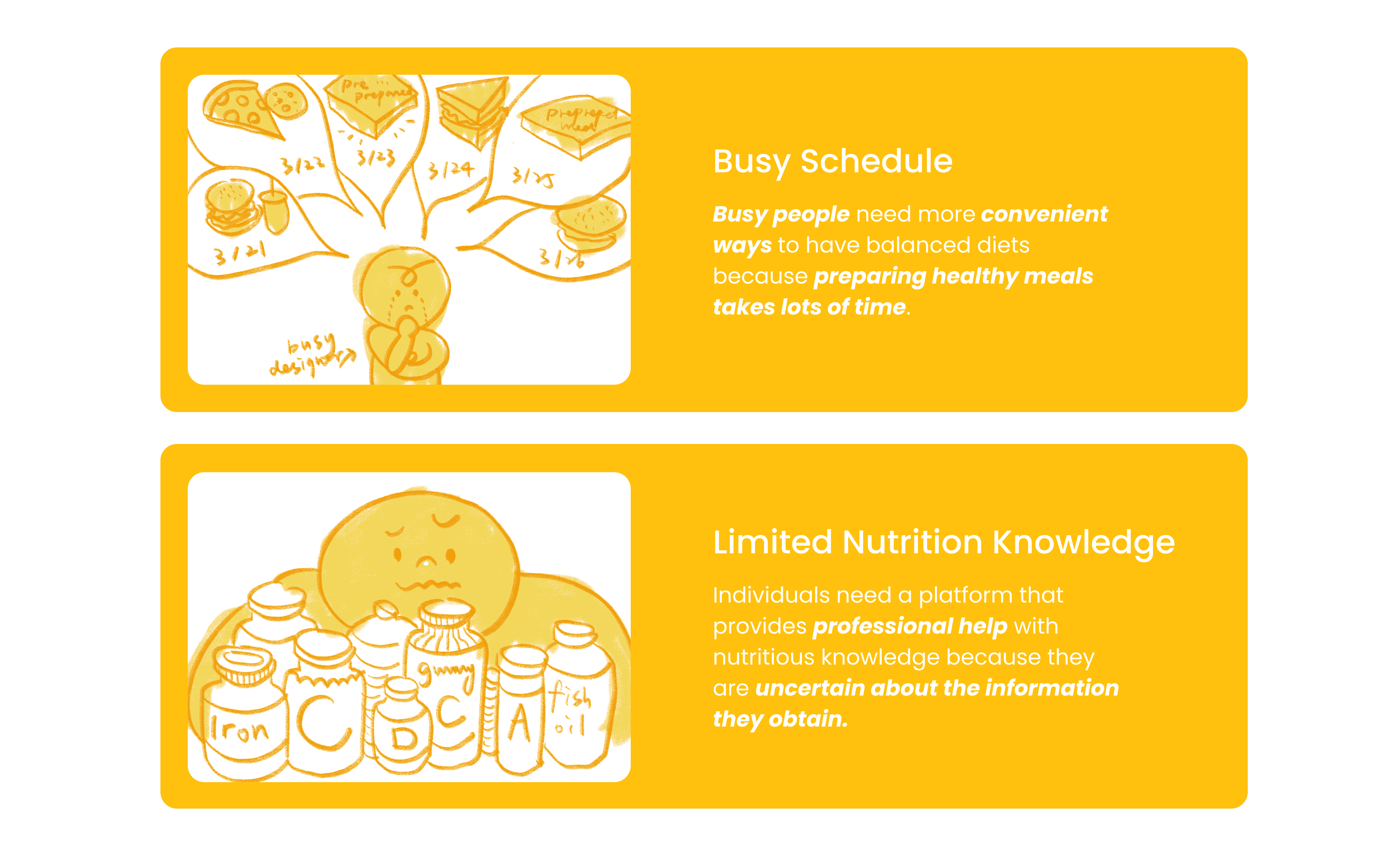
Design solution
How might we assist busy young adults to eat balanced and get educated?
Concept - Balanced Bites
An app and physical-based service are designed to assist individuals who are time budget-constrained in achieving a balanced diet. Our system has four main features: an AI nutrition tracker, food suggestions, and easy food intake upload through photos, voice, or text for nutrition analysis. Additionally, our nutrition supplement service offers users the opportunity to supplement any nutrients they may be lacking through conveniently located vending machines.
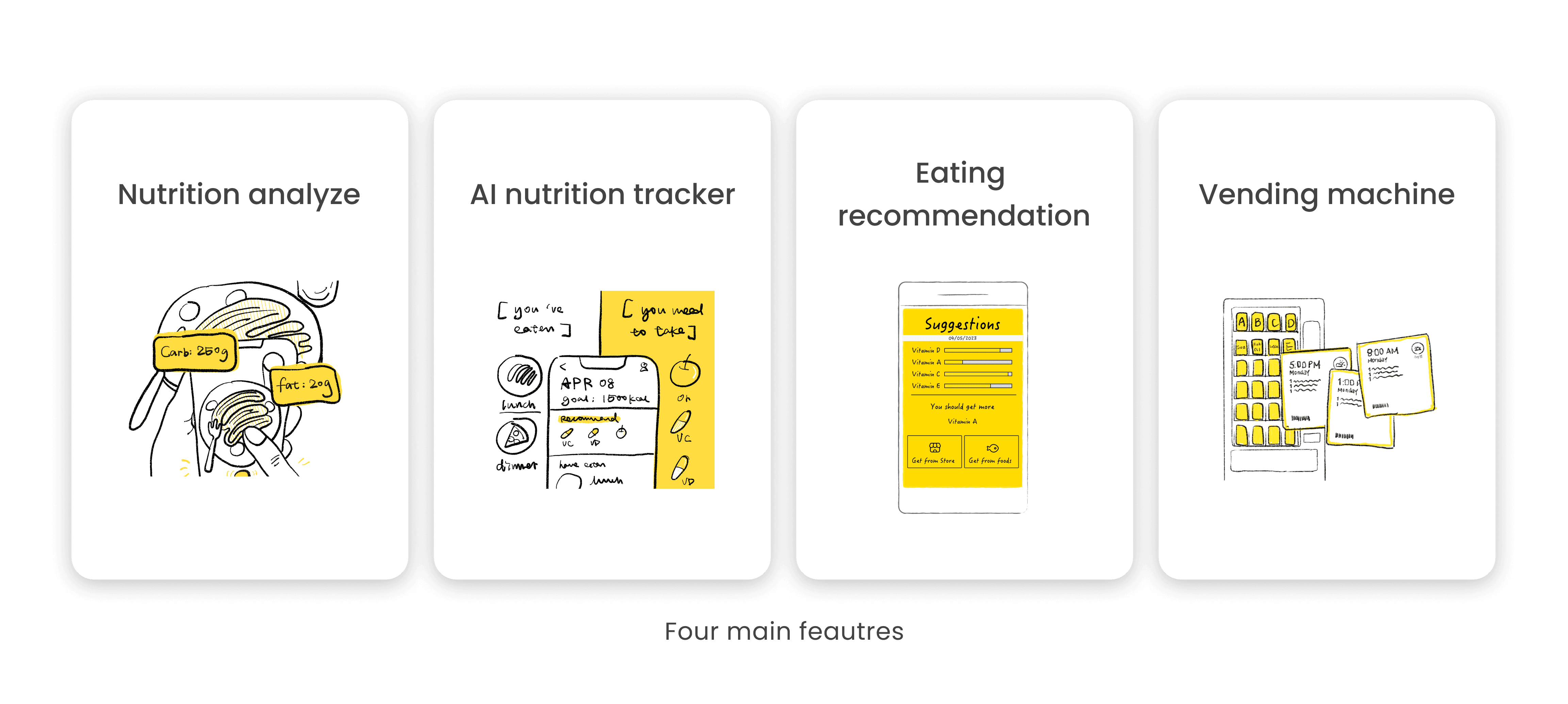
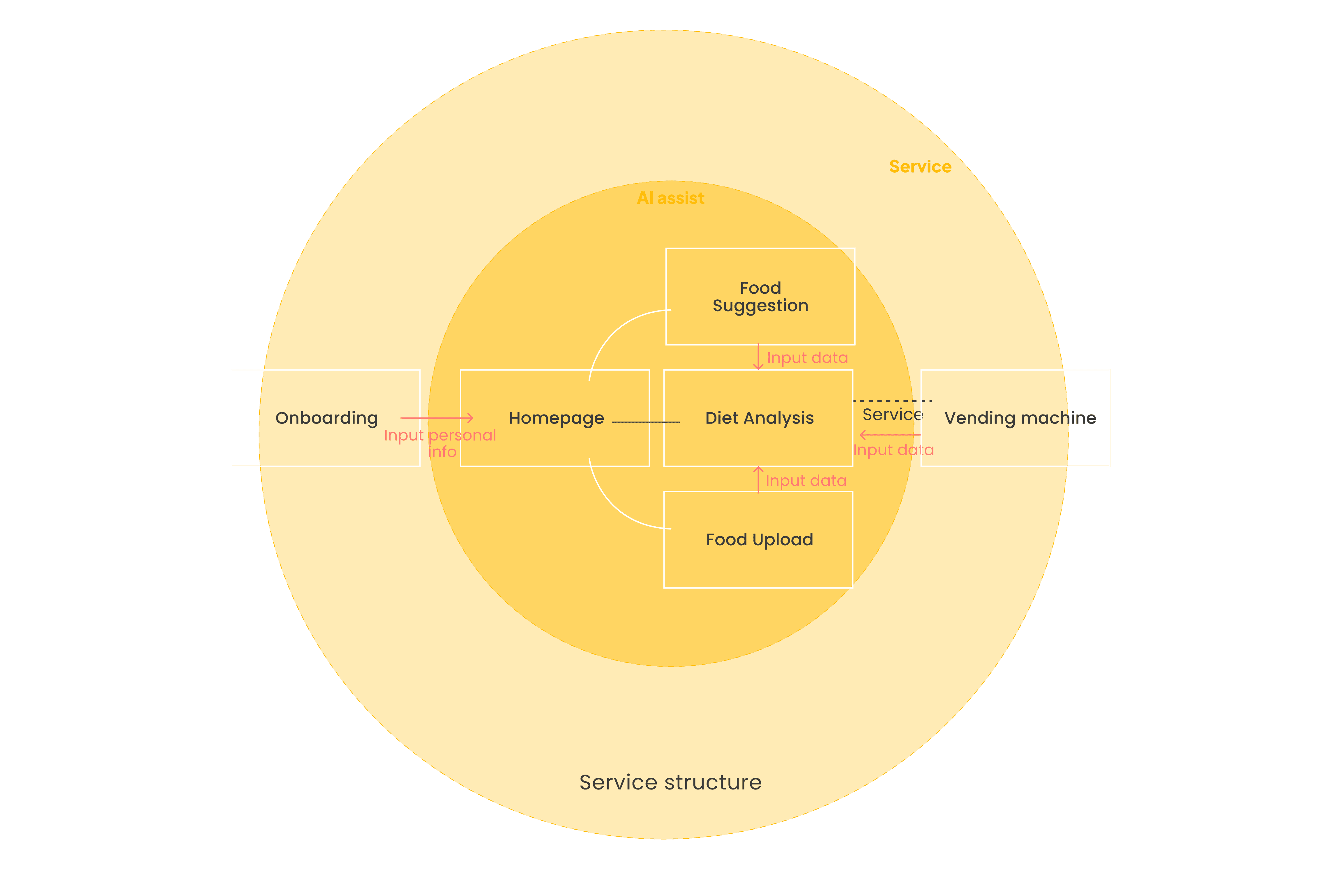
Wireframe
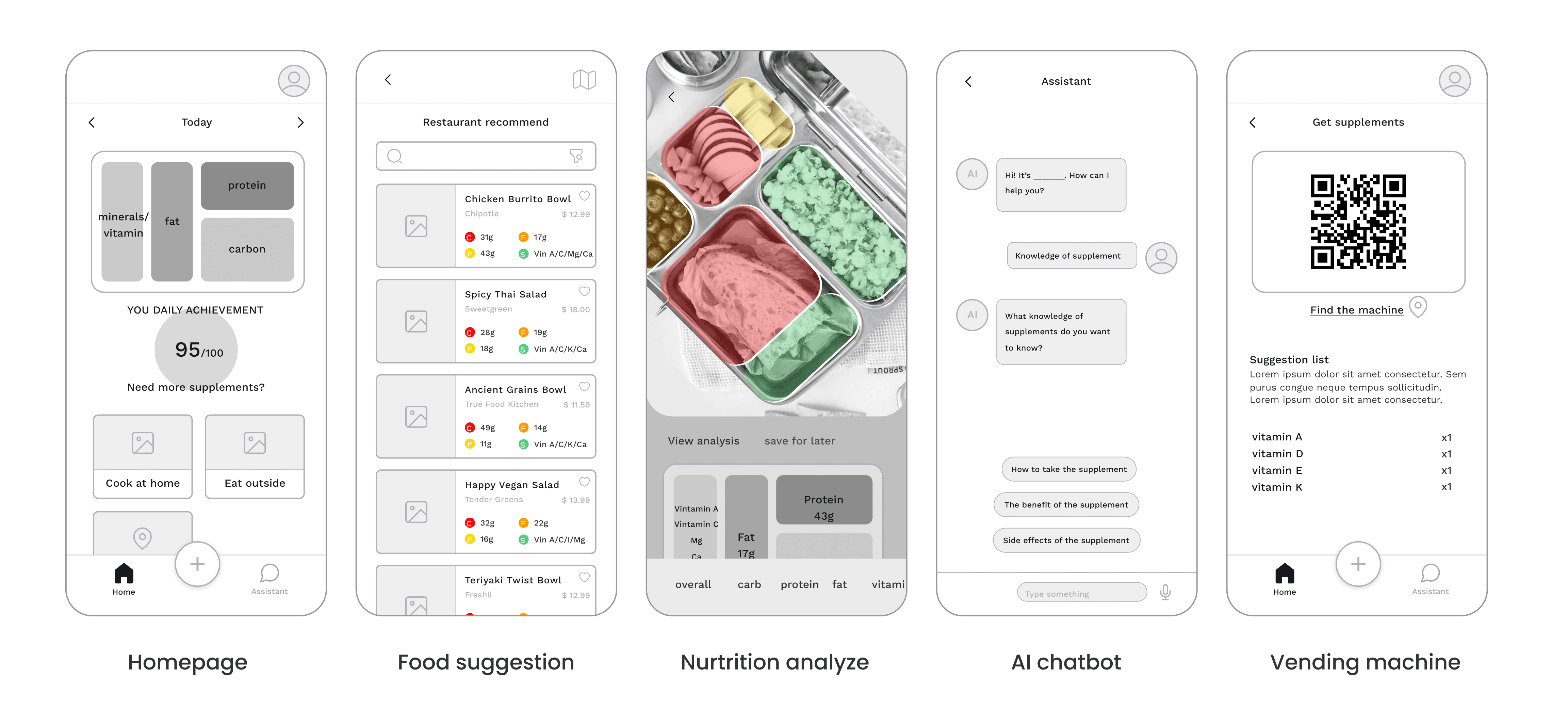
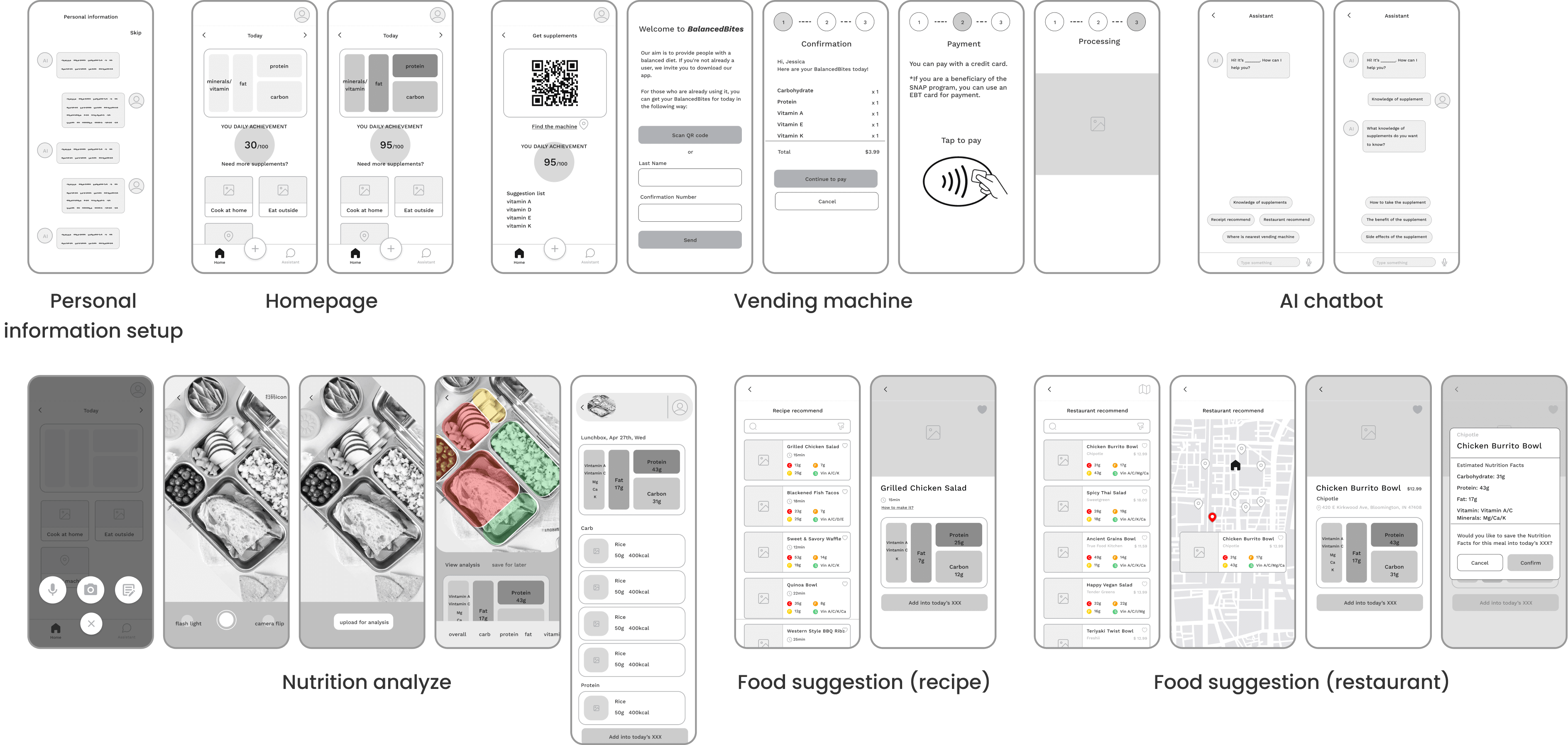
Testing
Collecting User Feedback
Since we weren't sure whether our solution would work with our users, we created a prototype and tested it. We created a lo-fi prototype of our main feature screen and used a physical paper-made machine to gather feedback from users. As a result of collecting users' feedback, we could iterate our design and make it more accessible to them.

Participants' feedback
The arrangement of items on the homepage is too messy, and it's confusing to figure out how to navigate.
Restaurant guidance is available only as a list, so users feel more hassle opening another application to find information.
Vending machines can sell things other than supplements, such as carbohydrates or protein powder.
Iteration
Interfaces and Processes should be adjusted based on the testing
Homepage arrangement
Issue: Issue: Users are confused about how to navigate from the homepage.
Adjustment: Rearrange the homepage items into two modules. The upper one is the Analysis system, the lower one is the Food Recommendation.
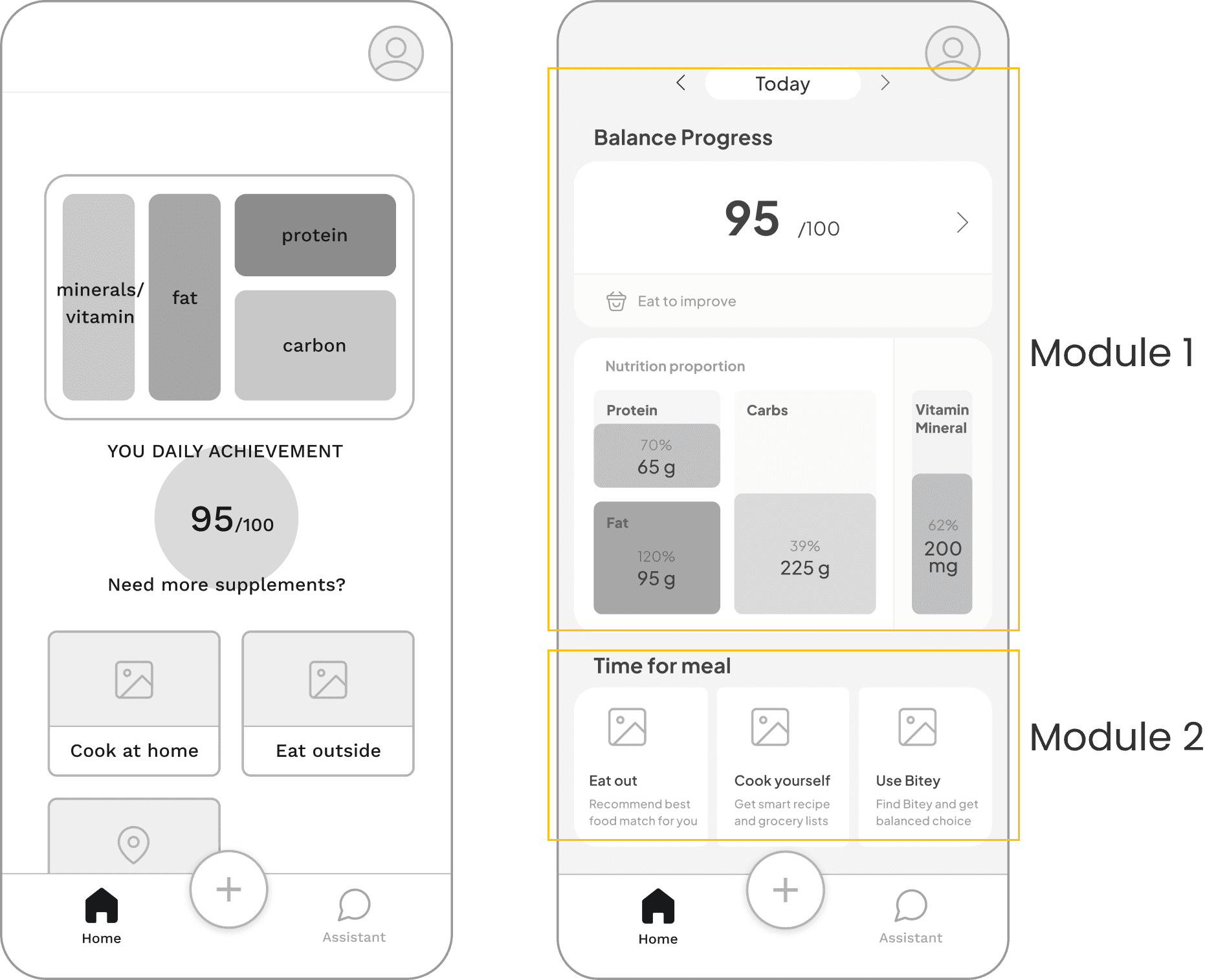
Enhance restaurant guidance
Issue: Issue: Limited to list-only restaurant guidance, lacking intuitive experience.
Adjustment: Provide map and list for users to find the nearest dishes of the restaurant and the vending machine.
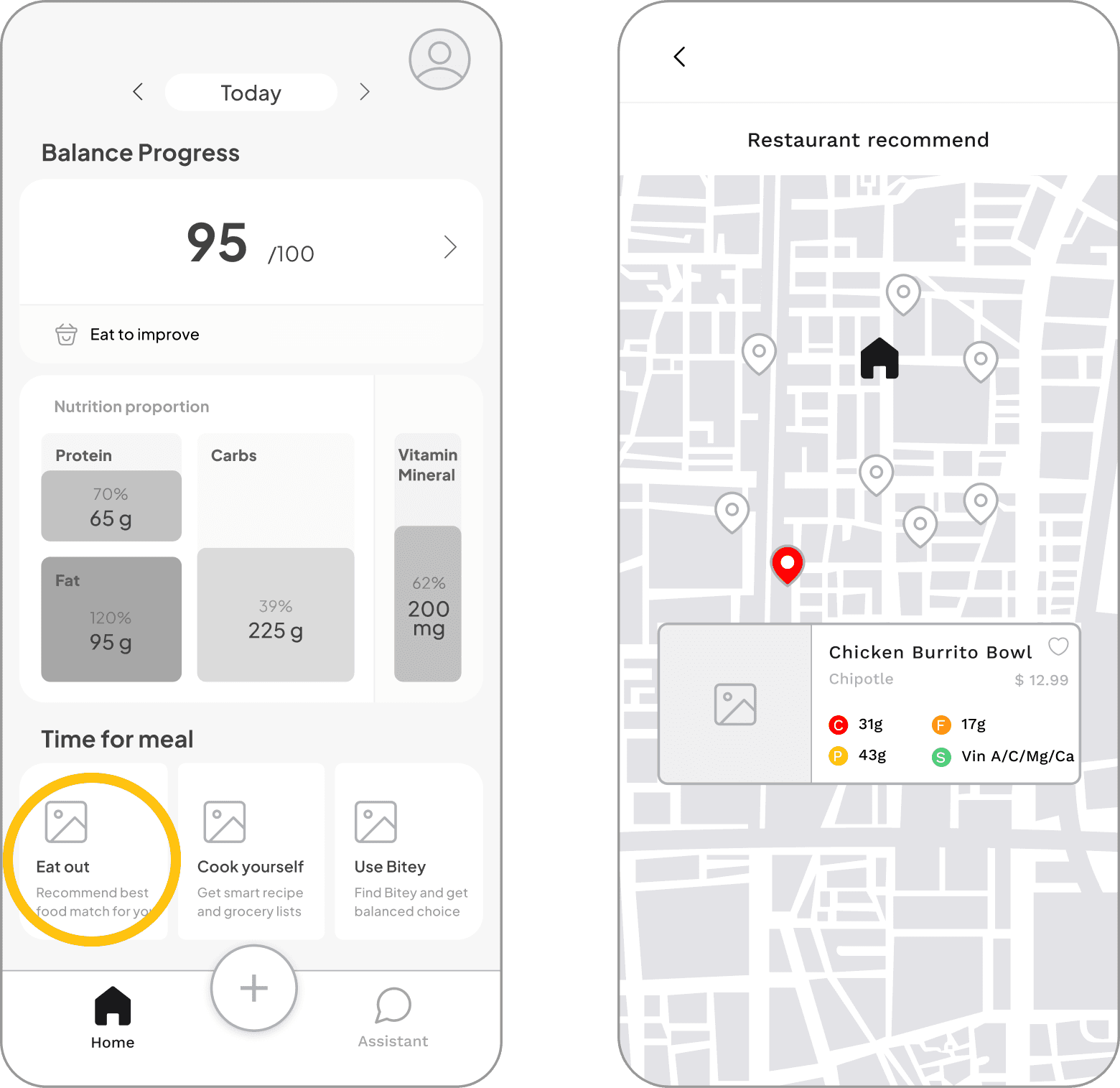
More options in the vending machine
Issue: Issue: The options in the vending machine are too limited.
Adjustment: Display other daily-recommended nutrients.

Final design
Enhancing each function for realistic product integration
We aim to offer straightforward nutrition services for time constraints young adults, providing personalized recommendations to inform their dietary choices. We combined online and offline systems for a seamless fit into busy lives.
Visual Plan
We used mood board to collect our inspiration. As balanced diet is about three major nutrients:carbs, protein and fat, and also vitamins and minerals. We determine the representative color of each nutrient through the perception of the mood board to form our color palette. Then, we come to three visual keywords.
Interface to be ENERGETIC.
Service and experience are APPROACHABLE for our target user.
Let users TRUST our guidance.
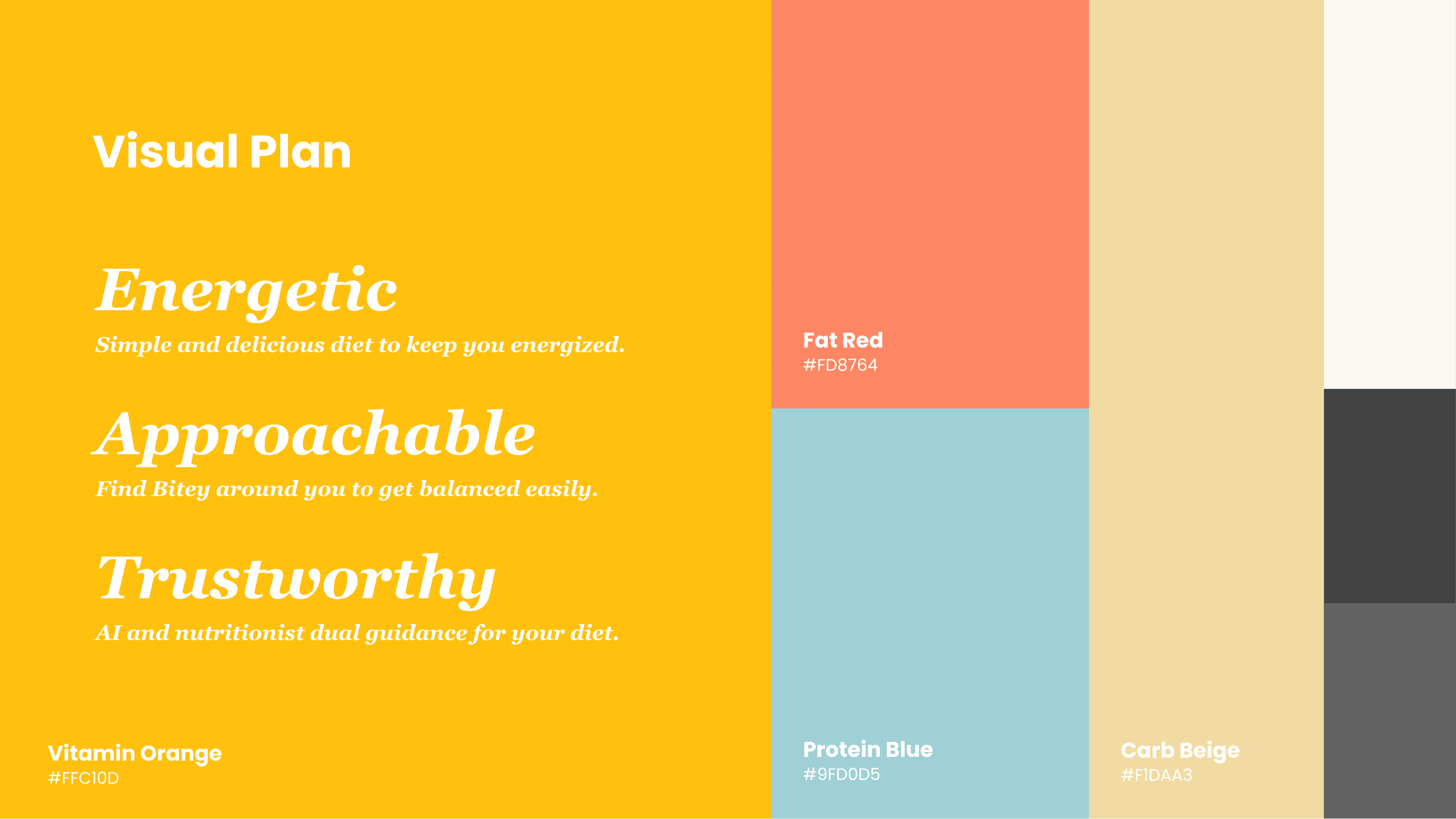
Design details
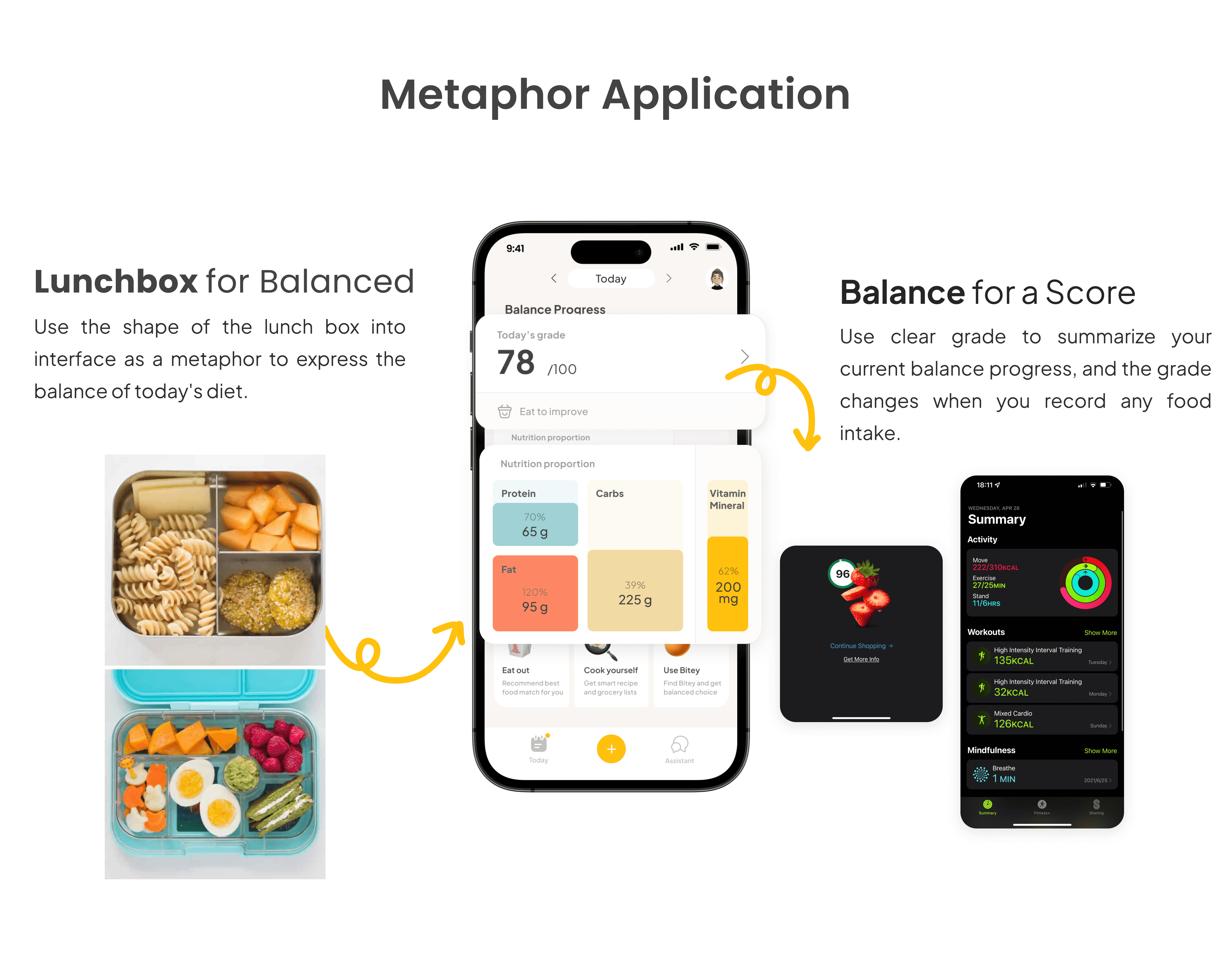

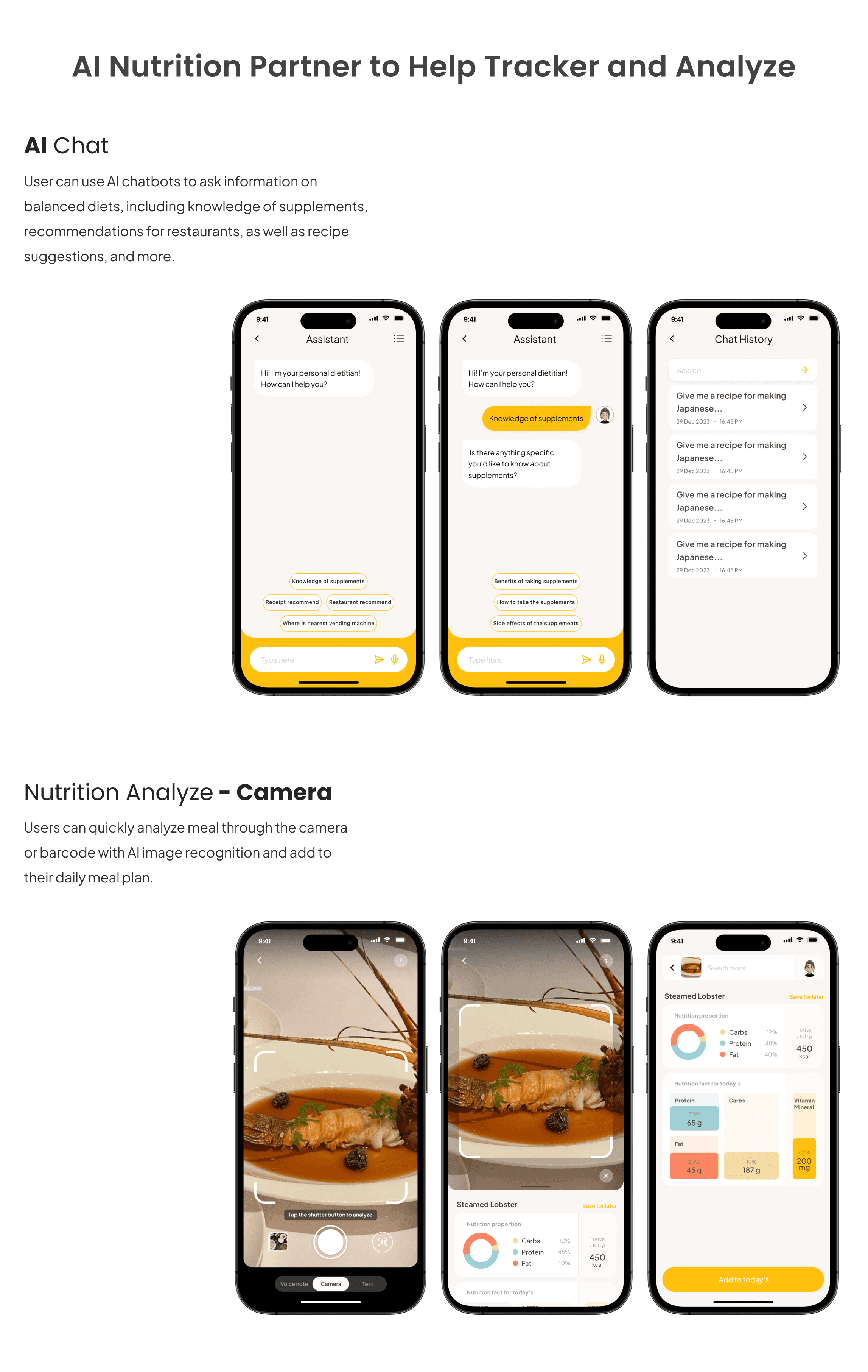
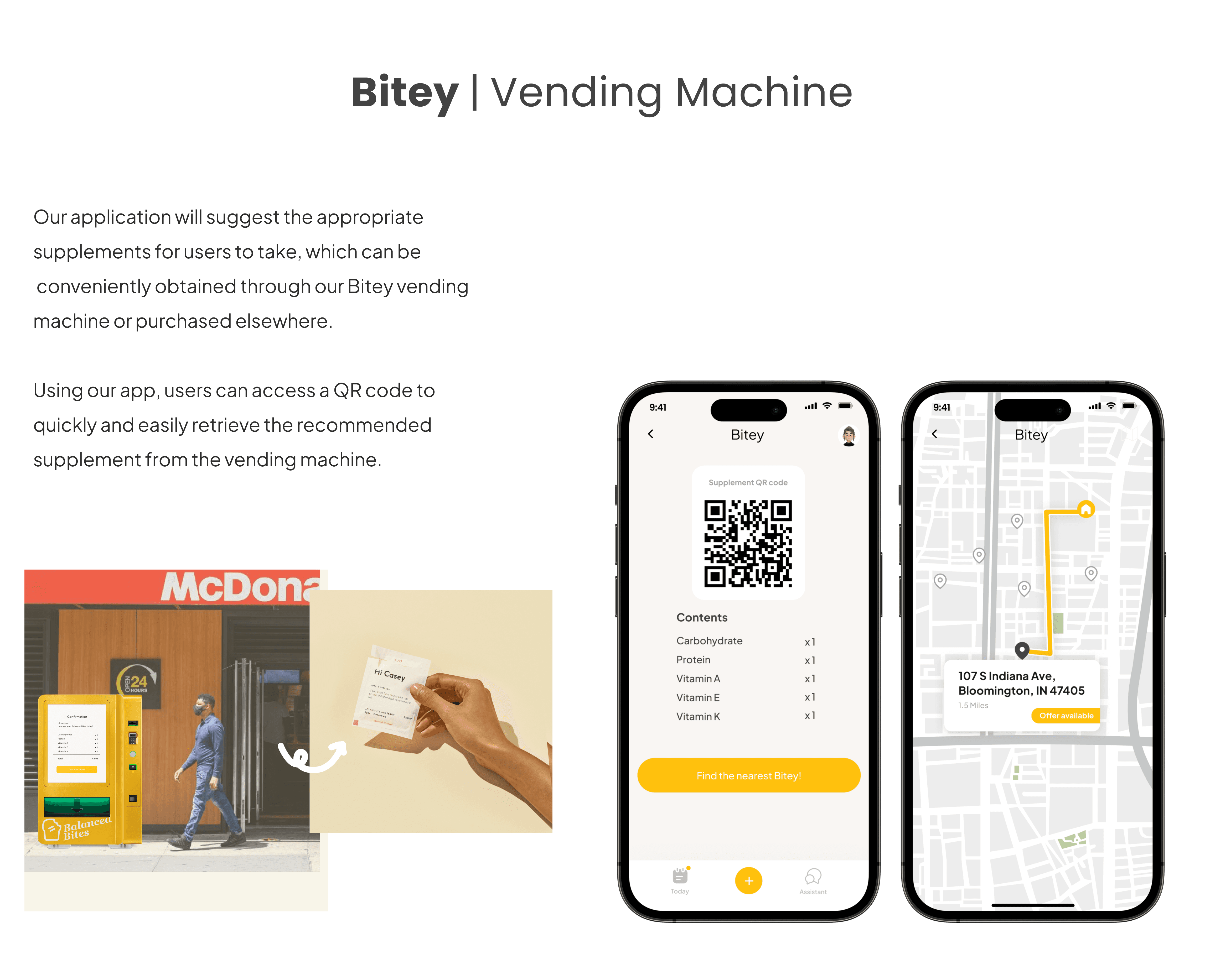
Opportunity & Reflection
To Complement, To Rethink, To Expect
Score Mechanism's Potential Impact on User Stress
The score mechanism in the service should be carefully designed to avoid causing anxiety or stress in users who have not yet achieved their goal score. Further testing and user research are necessary to ensure that the design is effective in encouraging healthy eating habits without overwhelming users.
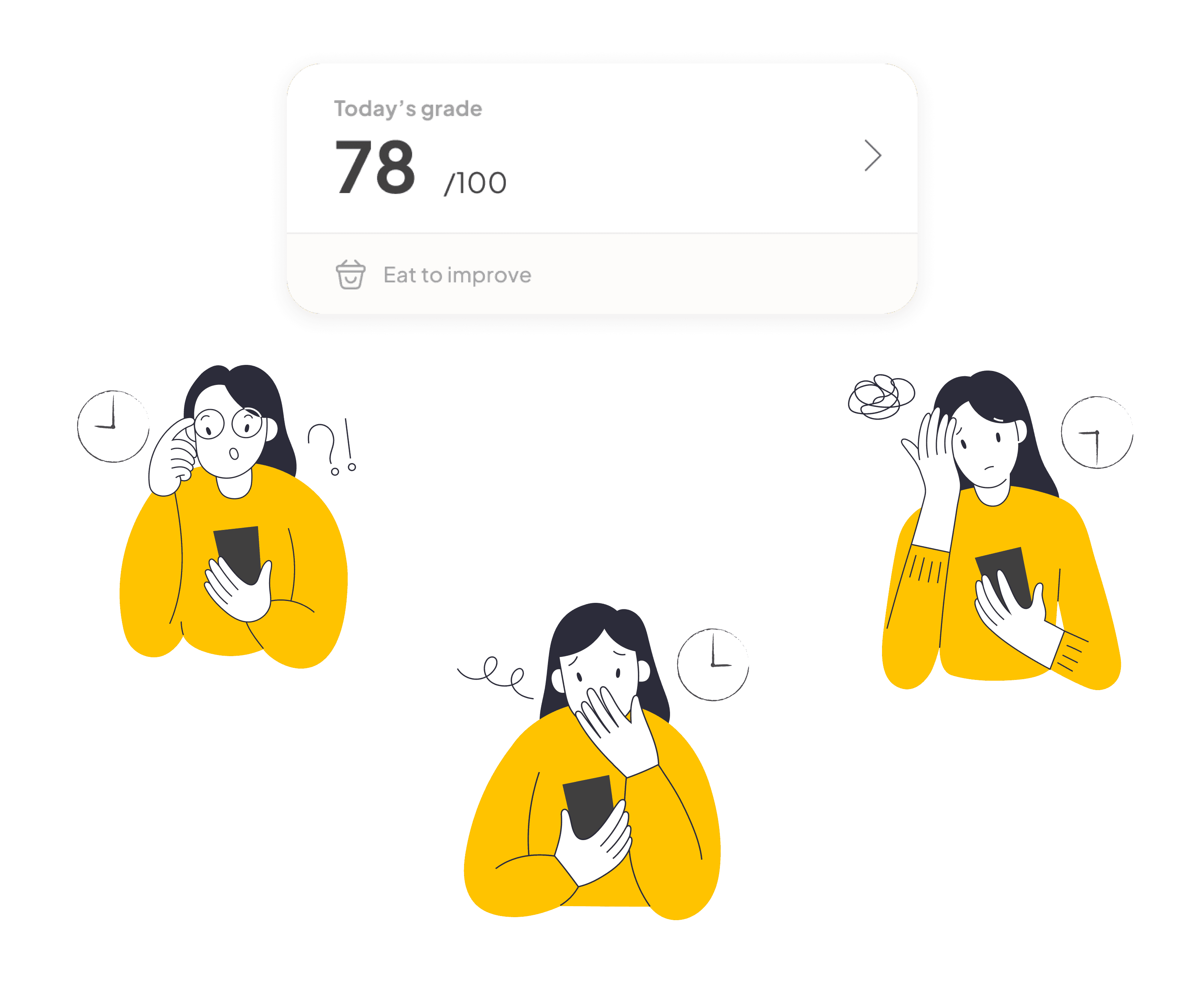
Expanding Social Engagement-Add "Share" feature
We plan to introduce a 'share' feature, enabling users to share their meals and recipes. Based on user feedback, we aim to enhance user interaction and inspire culinary exploration through connections with others.
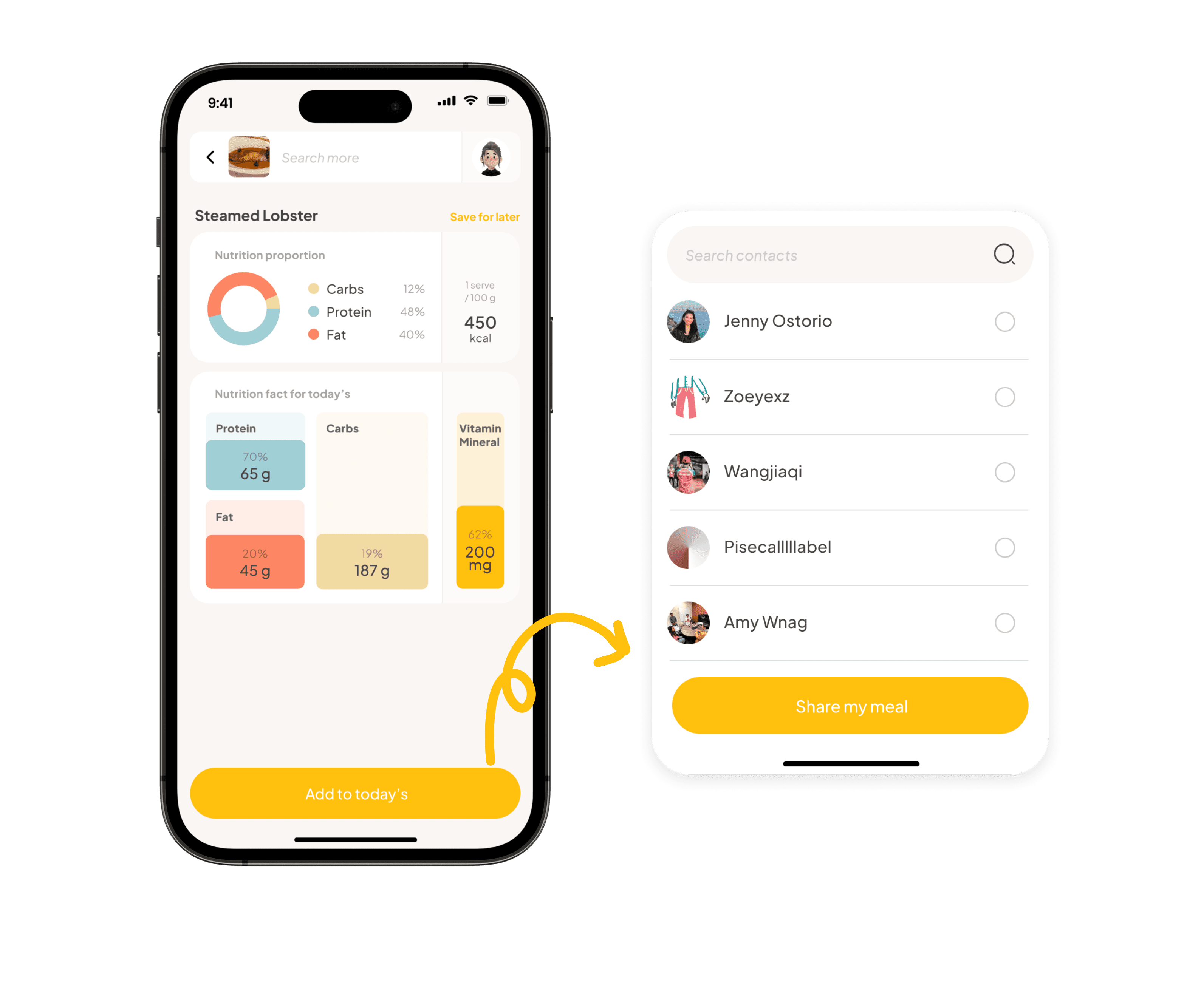
Creating a Productive Team Environment by Swiftly Adapting to Preferences
Balancing busy schedules and varying work preferences posed a challenge. We initially embraced online collaboration, assuming it would be more convenient. However, we soon discovered it often led to distractions and prolonged discussions.
To enhance teamwork, we quickly adapted. In-person meetings became reserved for decision-making, while online meetings handled work updates. This shift, based on understanding each member's preference, significantly improved our discussions' effectiveness.
